Befriending the Robin
Some fragmented thoughts on a harried parent in search of grubs, companionship in the garden, milkweed, other kinds of weed, and asparagus
Wednesday, May 31
Grand Rapids, Mich.
I’ve been trying to hold off on planting potatoes this year because of my struggles with Colorado potato beetles last year. While our backyard plot was beetle-free, the bugs infested half of my community-garden space, destroying all but two of my potato plants; I think I harvested five potatoes from that land.
Some gardeners suggest waiting until late June to plant potatoes avoid the beetles’ prime time. Unfortunately, my seed potatoes weren’t interested in my plans. They’ve been sprouting and growing, and finally, earlier this week, I decided I had to go ahead and put them in the ground.
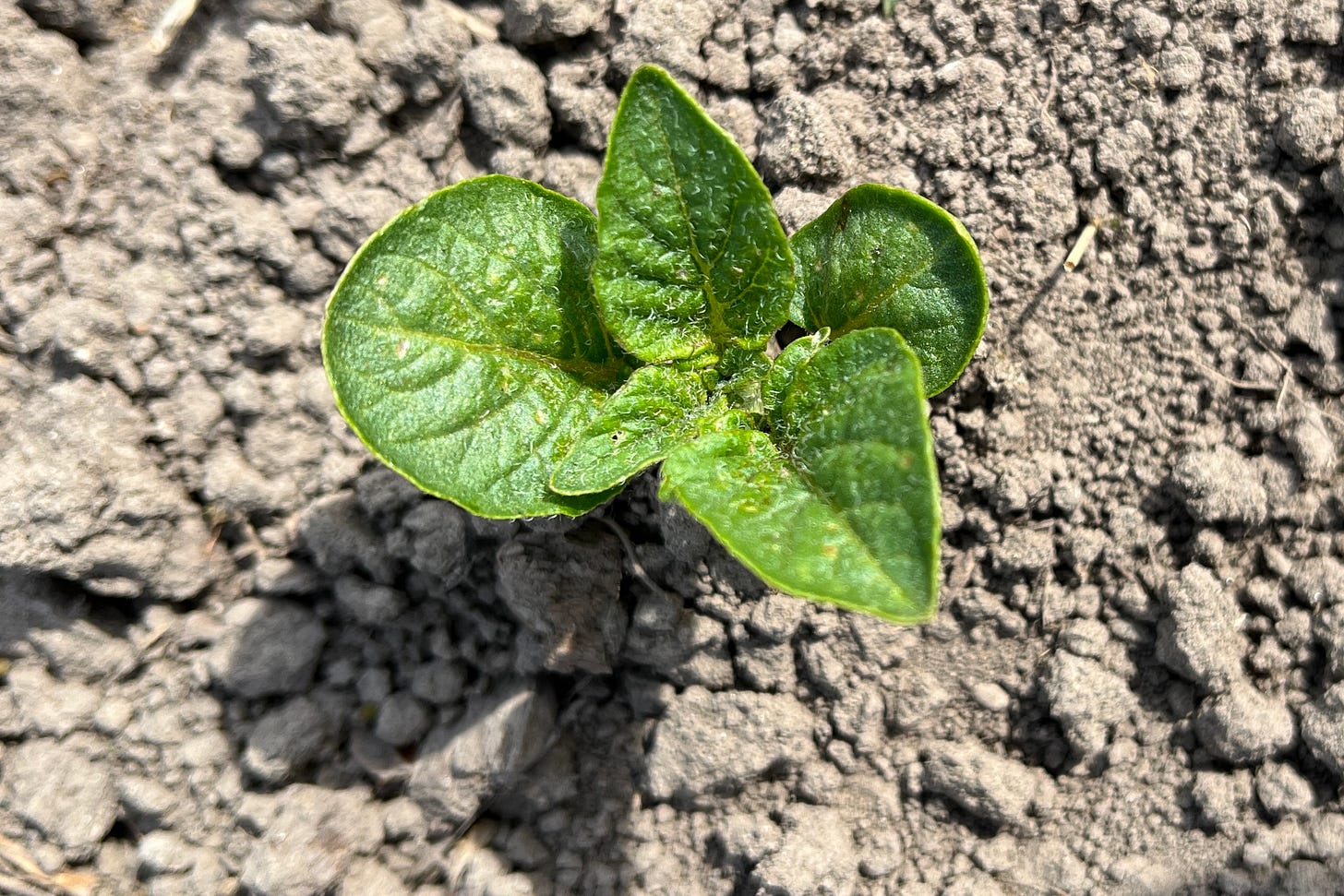
Shortly after I started digging, a robin showed up. It kept hopping and fluttering, hopping and fluttering, slowly tightening its orbit around me—twelve feet, then ten. Occasionally it would dart even closer, and then quickly retreat.
I had no idea what this robin was doing until I saw it peck at the ground and then fly to a nearby fencepost, where a juvenile robin waited—and not quietly. The kid was squawking and squawking, mouth wide open. The parent—I don’t know if it was Mom or Dad, and these days, it’s just better not to jump to any uninformed conclusions about gender identity—delivered whatever it had found into the mouth of its young, and then it flew back down toward me.
As the loudmouth child kept yelping from on high, its parent drew nearer and nearer to me, until it was no more than five feet away. It cocked its head as it gazed at me, and then it examined the soil that I’d just uncovered. I set down my trowel and watched it for a long minute. It found a grub, lifted its head, and then stood there with the wriggling creature in its beak, as if to show me what it wanted. Then it flew up to feed its young.
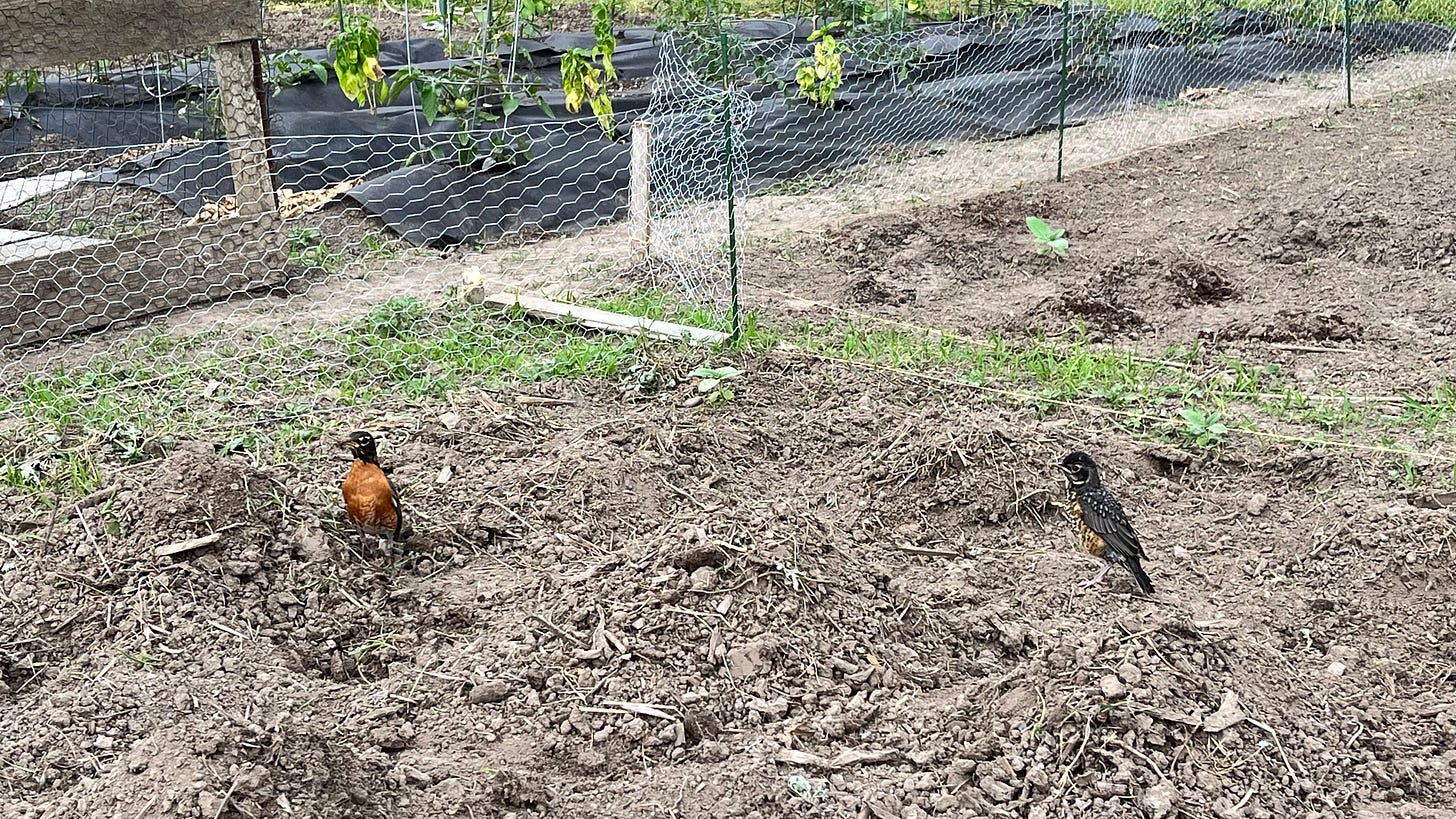
When it returned to me again, I decided to try something: With my trowel, I picked up a grub that I’d uncovered and I tossed it toward the robin. At first, it skittered away, but then it returned, snatched the grub, and flew off to feed the kid.
Then it came back.
Then we did it again.
And again.
And again.
For the next hour, as I dug and hilled the soil around my seed potatoes and then planted some beans, the robin stayed with me, leaving only to bring its insatiable child more food.
My people have no legends or superstitions about the robin, because China has no native robins. A few years ago, though, a European robin, which is not all that closely related to the American robin, somehow winged its way to Beijing. It caused a ruckus, drawing hordes of excited photographers. The European robin is Britain’s unofficial national bird, and some wry commentator joked that it must be a “Brexit refugee.”
The Ojibwe, who have long inhabited the Great Lakes region, do have an old tale about the robin. As with so many of these ancient stories, there are many variations. But the basic story goes like this: A boy named Opichi had just about reached the age of maturity. In those times, it was customary to fast in the hopes of receiving a guardian spirit. His father, who had huge ambitions for his son, sent Opichi out into the forest for his fast. Days went by, and still no guardian spirit came. Opichi suggested that maybe the time wasn’t right—that perhaps he could try again in a more auspicious season. But his father was insistent: Keep fasting. He was determined that Opichi was destined to become the greatest warrior, the most powerful man, and surely with a longer fast, an even more powerful guardian spirit would come. Opichi obediently did what he was told. When his father finally returned, Opichi was gone, but out from the shelter, there fluttered a lone robin, who would remain near humans as a source of solace and a symbol of consolation. This is why the robin, in the Ojibwe language, is called “opichi.”
It’s fascinating to me how humans always want to find deeper meaning in our surroundings. Can’t a robin just be a robin?
Even as I squatted in the soil, tossing grubs toward the robin, I desired more than just the obvious utilitarian explanation for its presence.
It likes me.
It finds my presence comforting.
It wants to be my friend.
This morning, I went back to the garden to plant some more beans, and within a few minutes of my arrival, a robin—of course I told myself it was that robin—was back, hopping around me and eagerly grabbing whatever grubs I could toss in its direction.
It likes me.
It finds my presence comforting.
It wants to be my friend.
Even as I write these words, I have to laugh at how needy I am.
Truth is, the bird just has this squawky, gasbag kid who is constantly hungry, and it’s trying to do its best to satisfy the insatiable.
Regardless, I was grateful for the company. And maybe the lesson for me is that it’s enough for the robin to be a robin and for me to be me. I can just be a good and attentive neighbor—nothing more, nothing less.
What Else I’m Growing: The milkweed that I transplanted into our yard last year is coming back up. I wanted to plant some milkweed as a tiny gesture toward helping monarch butterflies, which last year were added to the IUCN’s Red List of endangered species. (The U.S. government has not yet followed suit, so the monarch isn’t protected here.) Michigan is home to a migratory population of monarchs, and some researchers believe that our climate could be a safe haven for the butterflies as other parts of the country warm. But that depends on having enough native milkweed to host the butterflies’ eggs and caterpillars.
What I’m Reading: I don’t know what it says about me that friends now send me articles about weeds. My friend Laura texted me the link to a piece from the most recent issue of The New Yorker, which she knows I would otherwise get to a year from now, thanks to the ever-growing pile of that magazine on our coffee table. Rivka Galchen, whose work I always enjoy, goes on a foraging trip with a character named Wildman Steve, who leads foraging tours of Prospect Park in Brooklyn. (Some years ago, I went with friends on one of those tours and returned home with great ambitions of feeding my household with free food from the park. Tristan was not thrilled by the idea.) Then Galchen looks at what a weed actually is: “One way to think of weeds is as a plant in a place where it isn’t wanted. Ralph Waldo Emerson described weeds as plants ‘whose virtues have not yet been discovered,’ and even the usually less exuberant Henry David Thoreau wrote, ‘Shall I not rejoice also at the abundance of the weeds whose seeds are the granary of the birds?’ Weeds can also be thought of as taking up the sun and nutrients that other plants—and the insects, birds, and humans that rely on those plants—need. Weeds can be undervalued; weeds can be bullies.” The whole piece is geeky and fascinating.
What I’m Cooking: We’re in the midst of asparagus season here, and our household philosophy about asparagus goes as follows: We want to eat it until we’re sick of it.
In Remembrance of Things Past, Marcel Proust unleashes his purple prose on the asparagus. (You didn’t think he ate only madeleines, did you?) After eating asparagus, he wondered about “the presence of exquisite creatures who had been pleased to assume vegetable form, who, through the disguise which covered their firm and edible flesh, allowed me to discern in this radiance of earliest dawn, these hinted rainbows, these blue evening shades, that precious quality which I should recognize again when, all night long after a dinner at which I had partaken of them, they played (lyrical and coarse in their jesting as the fairies in Shakespeare's Dream) at transforming my humble chamberpot into a bower of aromatic perfume.”
Did Proust have an editor?
We have one particular stand at the farmers’ market where we always get ours (last year, for some unknown reason, I bought some at a different stand one unfortunate week, and we regretted it shortly afterward, because it just wasn’t the same). We’ve had grilled asparagus as a side with burgers; asparagus stir-fried with tofu; asparagus and mushroom pasta; and grilled asparagus on toast, topped with an over-easy egg. We’ll do a white pizza with asparagus soon. Any favorite asparagus recipes?
An update on Uganda: The anti-LGBTQ+ legislation that I wrote about, and that my friend Clare Byarugaba has been so valiantly fighting, has been signed into law by Ugandan President Yoweri Museveni. It’s especially galling to me that the speaker of the Ugandan Parliament praised the signing by saying that the president had “answered the cries of our people.” What about the cries of LGBTQ+ Ugandans and their families? I’ll share any updates from Clare if and when she wishes to share. For now, if you’re the praying kind, please remember the families of PFLAG-Uganda and all who are now feeling even more unsafe there in your prayers.
What are you wondering about or worrying about this week? What has captured your attention? What are you reading? What are you cooking? Where are you finding beauty and hope? I’d love to know.
As ever, I’m so grateful we can stumble through all this together, and I’ll try to write again soon.
All my best,
Jeff


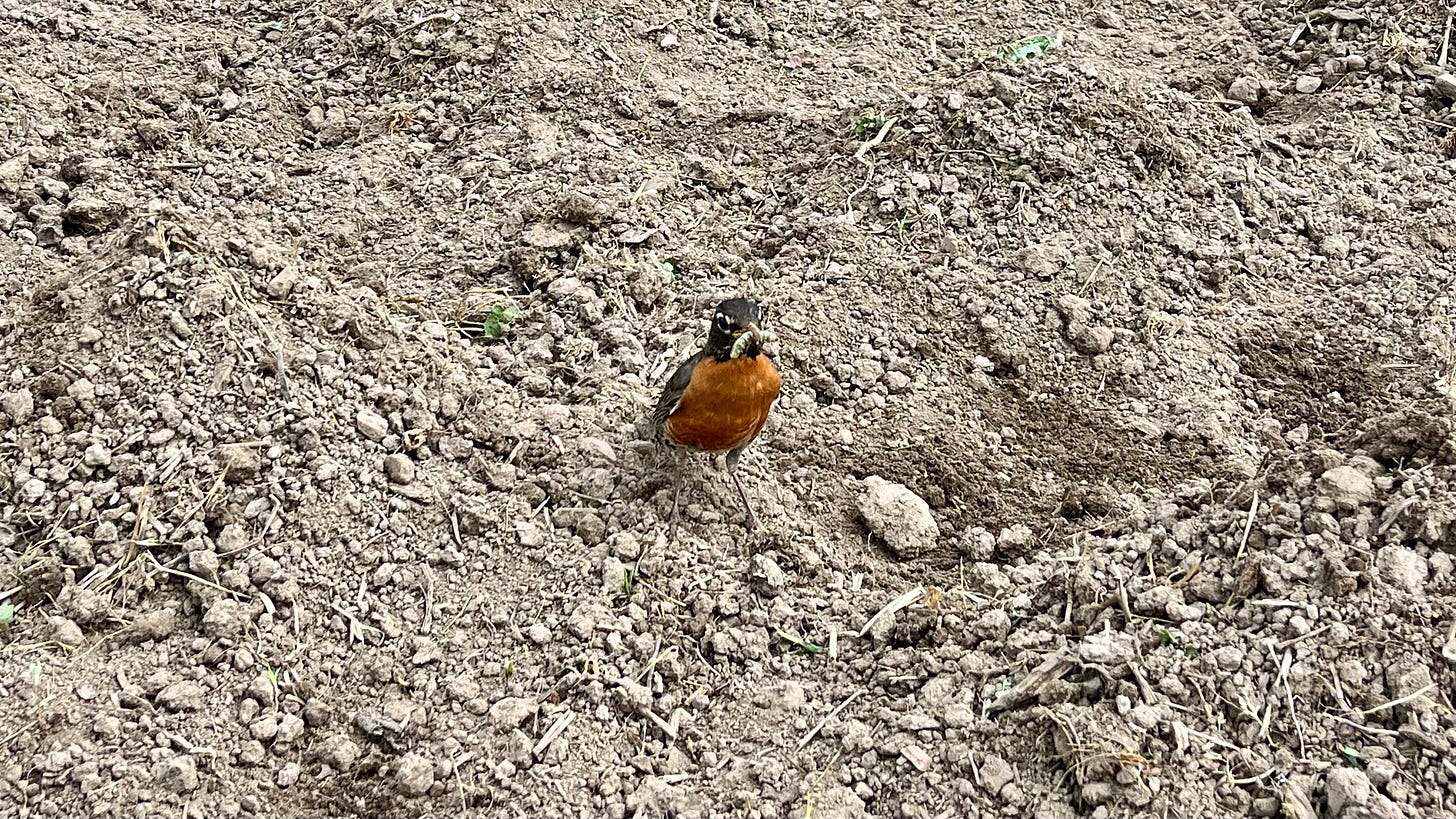
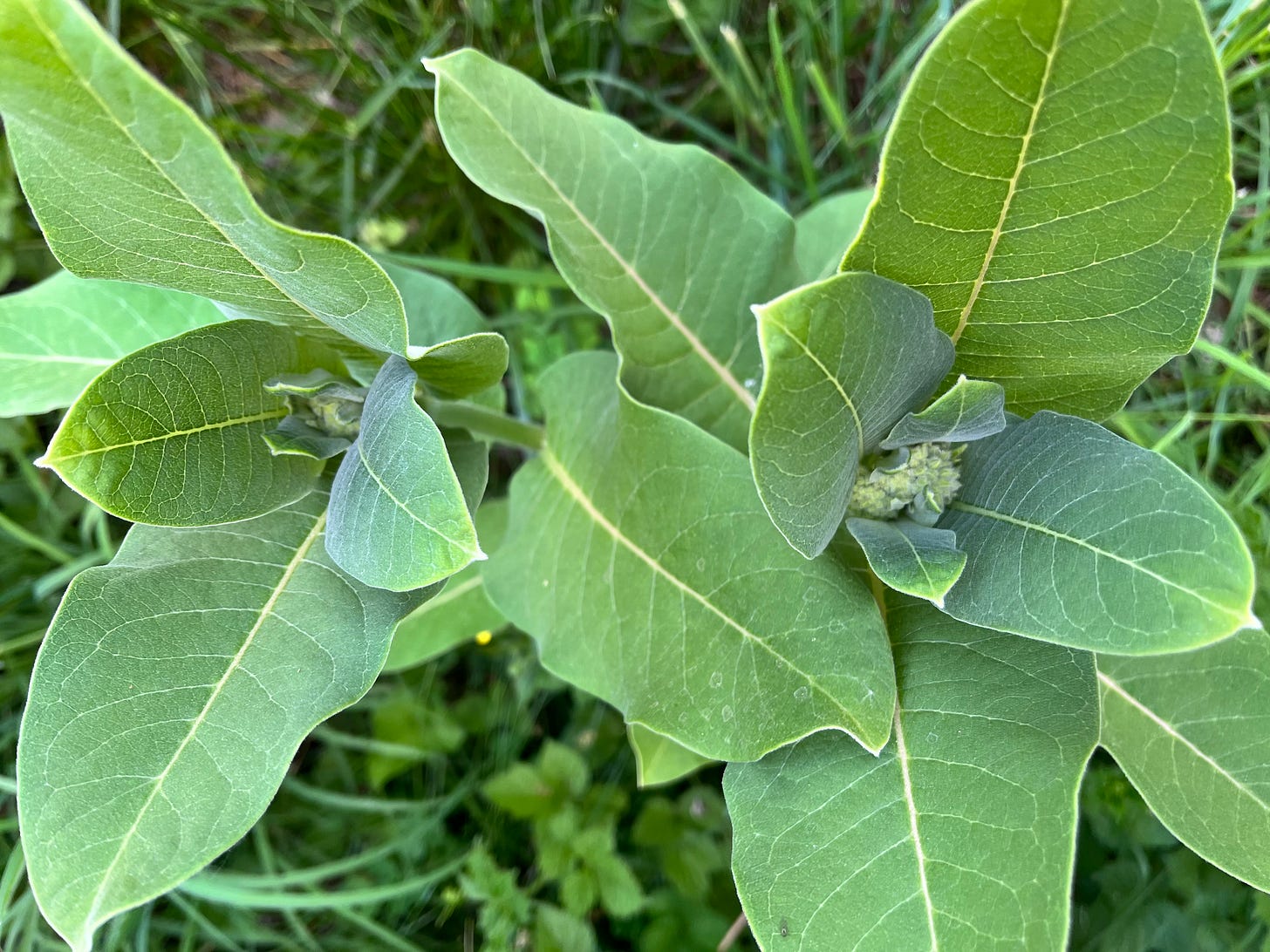
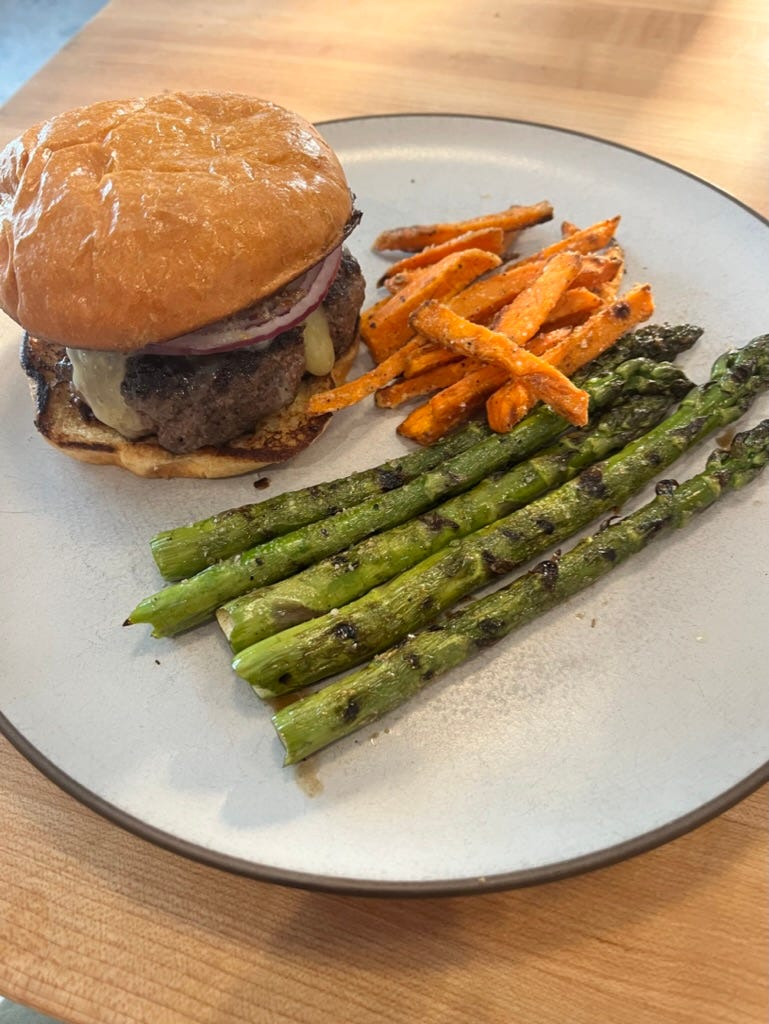
I really loved this, Jeff. I currently have a Spotted Towhee that has been visiting me daily this week. I cannot get close or move because he flies away. He doesn’t visit my window bird feeder like finches and chickadees do. Towhees look on the ground to see what fell out of the feeder or dropped from elsewhere. He doesn’t mix with the other birds but he watches nearby. Yesterday, I heard a sound and let out a great big laugh as I saw the Towhee’s head in the bottom corner of my kitchen window. He was looking in the house at me and watching. Just his little head peaking in and gawking. I guess turnabout is fair play since I spend so much time watching him and the other birds in my garden and on my daily walks to the blue heron and bald eagle nesting grounds near my house. I have a specific red wing blackbird I see every single visit too and I have been thinking I might give him a name. I love birds, but I have a complicated relationship with the crows who think it is funny to leave animal body parts, bread and assorted weird items in my birdbath. They are having epic pool parties it seems.
Heartbroken about Uganda, and for so many situations closer to home where fear and hate seem to be so loud